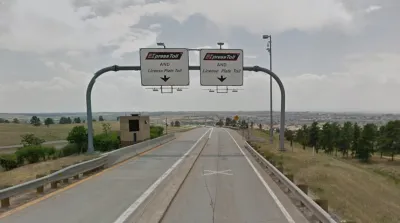It's not the widening of Interstate 25 that rattled attendees of the public meeting held by the Colorado Department of Transportation on Dec. 7—it's the fact that that they would have to pay to use the new lanes.

"The Colorado Department of Transportation [CDOT] is moving forward with plans to expand the problem area [see map below] of Interstate 25 between Monument and Castle Rock, known as the 'gap,' reports Samantha Marks for Fox21 News on Dec. 8.
Courtesy CDOT: I-25 South "The Gap"
"Almost everybody we talked to tonight is in disapproval of this new idea from CDOT," recaps Marks in the video (accompanying the article) taken during the Dec. 7 meeting held by CDOT to get feedback on the changes to their existing plans to improve the 18-mile gap by adding one lane in each direction to the four-lane highway.
Voters approved funding for the widening of the gap in the general election, but some feel the express lane isn't what they were voting for.
As posted last month, Colorado Springs and El Paso County voters approved two measures to authorize the widening and provide about $25 million toward the $350+ million project, but the measures didn't specify the lanes would operate as express, i.e., toll lanes, though it was reported by the media.
"I think they ought to increase the state gas tax a couple of cents, and build those lanes without the tolls. It should be open to the public," said Joe Mark, who travels the I-25 gap often.
Colorado hasn't increased its 22 cents per gallon state gas tax, well below the national average of 33.33 cents per gallon, since 1991. While many state legislators would support increasing it to pay for road construction, would it be supported by voters?
"Because of Colorado’s Taxpayer’s Bill of Rights, any agreement lawmakers reach to raise taxes to pay for roads will have to go to the ballot box for approval," reported Brian Eason for The Denver Post on Feb. 6 (posted here). The legislature unsuccessfully attempted to pass an increase in the sales tax this year to pay for roads. Had it passed, it would have gone to the voters for final approval.
"The citizens of Colorado Springs and Colorado shouldn't subsidize lanes for the rich and famous," added Mark at the CDOT meeting.
Fox21's Marks indicates that the "price would run between $1 and $3, depending on the time of day you are driving and the amount of people on the roads." She adds that toll revenue wouldn't go toward road construction but maintenance of the road, which is very important considering CDOT's stressed budget.
"CDOT, which faces an annual budget shortfall of roughly $1 billion for infrastructure improvements needed statewide, has relied increasingly on toll lanes to finance and levy other funding sources for large-scale projects," reports Rachel Riley for The Gazette on Dec. 4.
A CDOT spokesman told The Gazette on Friday that construction on the project could begin in late 2018 - nearly a year earlier than expected - and end in spring 2021 if funding sources are finalized [italics added].
Incoming CDOT Executive Director Michael Lewis said "there's still some uncertainty" regarding the funding for the $350 million widening. Officials are hoping to pay for the project using a combination of local, state and federal funds. But CDOT won't know until the spring if the project has been chosen for a highly competitive $65 million grant from the U.S. Department of Transportation's Infrastructure for Rebuilding America program.
Subsidizing roads through sales of state buildings
Colorado's Transportation Commission voted in October to tentatively designate about $250 million - some of the money that a new state law is expected to generate through the sale of state-owned buildings - to the widening. But if the project doesn't receive the federal grant, state transportation officials have said they will need to revisit the allocation.
FULL STORY: Public gives feedback on I-25 express toll lanes

Analysis: Cybertruck Fatality Rate Far Exceeds That of Ford Pinto
The Tesla Cybertruck was recalled seven times last year.

National Parks Layoffs Will Cause Communities to Lose Billions
Thousands of essential park workers were laid off this week, just before the busy spring break season.

Retro-silient?: America’s First “Eco-burb,” The Woodlands Turns 50
A master-planned community north of Houston offers lessons on green infrastructure and resilient design, but falls short of its founder’s lofty affordability and walkability goals.

Test News Post 1
This is a summary

Analysis: Cybertruck Fatality Rate Far Exceeds That of Ford Pinto
The Tesla Cybertruck was recalled seven times last year.

Test News Headline 46
Test for the image on the front page.
Urban Design for Planners 1: Software Tools
This six-course series explores essential urban design concepts using open source software and equips planners with the tools they need to participate fully in the urban design process.
Planning for Universal Design
Learn the tools for implementing Universal Design in planning regulations.
EMC Planning Group, Inc.
Planetizen
Planetizen
Mpact (formerly Rail~Volution)
Great Falls Development Authority, Inc.
HUDs Office of Policy Development and Research
NYU Wagner Graduate School of Public Service

























